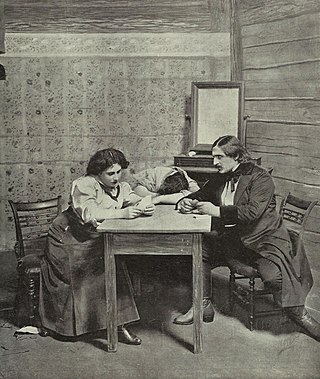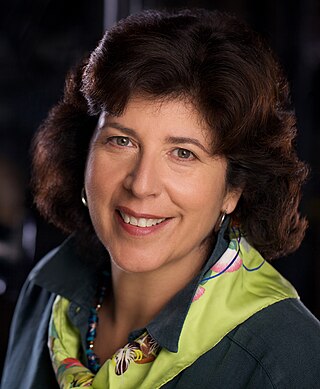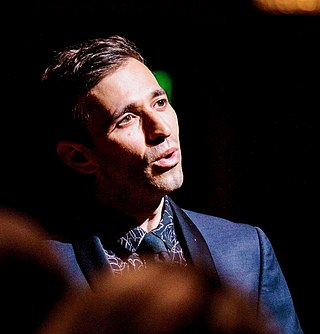Related Research Articles

La fanciulla del West is an opera in three acts by Giacomo Puccini to an Italian libretto by Guelfo Civinini and Carlo Zangarini, based on the 1905 play The Girl of the Golden West by the American author David Belasco. Fanciulla followed Madama Butterfly, which was also based on a Belasco play. The opera has fewer of the show-stopping highlights that characterize Puccini's other works, but is admired for its impressive orchestration and for a score that is more melodically integrated than is typical of his previous work. Fanciulla displays influences from composers Claude Debussy and Richard Strauss, without being in any way imitative. Similarities between the libretto and the work of Richard Wagner have also been found though some attribute this more to the original plot of the play, and have asserted that the opera remains quintessentially Italian.

The Glimmerglass Festival is an American opera company. Founded in 1975 by Peter Macris, the Glimmerglass Festival presents an annual season of operas at the Alice Busch Opera Theater on Otsego Lake eight miles (13 km) north of Cooperstown, New York, United States. The summer-only season usually consists of four productions performed in rotating repertory. Glimmerglass is well known for producing new, lesser-known, and rare works, many of which in years past have been co-produced with the New York City Opera. It is the second-largest summer opera festival in the United States, currently led by artistic and general director Robert Ainsley, who succeeded Francesca Zambello in 2022.

Jeanine Tesori, known earlier in her career as Jeanine Levenson, is an American composer and musical arranger best known for her work in the theater. She is the most prolific and honored female theatrical composer in history, with five Broadway musicals and six Tony Award nominations. She won the 1999 Drama Desk Award for Outstanding Music in a Play for Nicholas Hytner's production of Twelfth Night at Lincoln Center, the 2004 Drama Desk Award for Outstanding Music for Caroline, or Change, the 2015 Tony Award for Best Original Score for Fun Home, making them the first female writing team to win that award, and the 2023 Tony Award for Best Original Score for Kimberly Akimbo. She was named a Pulitzer Prize for Drama finalist twice for Fun Home and Soft Power.

Dead Man Walking is the first opera composed by American Jake Heggie, with a libretto by playwright Terrence McNally. Based on the book of the same name by Sister Helen Prejean, C.S.J., the work premiered on October 7, 2000, at the War Memorial Opera House, produced by the San Francisco Opera.
The Ghosts of Versailles is an opera in two acts, with music by John Corigliano to an English libretto by William M. Hoffman. The Metropolitan Opera had commissioned the work from Corigliano in 1980 in celebration of its 100th anniversary, with the premiere scheduled for 1983. Corigliano and Hoffman took as the starting point for the opera the 1792 play La Mère coupable by Pierre Beaumarchais. They took seven years to complete the opera, past the initial deadline. The opera received its premiere on December 19, 1991, at the Metropolitan Opera, with the production directed by Colin Graham. The premiere run of seven performances was sold out. The original cast included Teresa Stratas, Håkan Hagegård, Renée Fleming, Graham Clark, Gino Quilico, and Marilyn Horne. The Metropolitan Opera revived the opera in the 1994/1995 season.

Francesca Zambello is an American opera and theatre director. She is the artistic director of Washington National Opera.
Rodney Gilfry is a leading American operatic baritone. After launching his career at Frankfurt Opera in 1987, Gilfry quickly established a reputation for stylish singing and acting. A renowned Mozart specialist, he has given acclaimed performances as Don Giovanni, Count Almaviva, Guglielmo, and Papageno, and is also known for his work in roles from the standard baritone repertoire.
Tazewell Thompson is an American theatre director, the former artistic director of the Westport Country Playhouse (2006–07) in Westport, Connecticut and the Syracuse Stage (1992–95) in New York state. Prior to that he was an assistant director at Arena Stage in Washington, D.C. He is the Director of Opera Studies at Manhattan School of Music.

L'assedio di Calais is an 1836 melodramma lirico, or opera, in three acts by Gaetano Donizetti, his 49th opera. Salvatore Cammarano wrote the Italian libretto, which has been described as "...a remarkable libretto, the closest Cammarano ever got to real poetry, particularly in his description of the embattled city and the heartfelt pride of its citizens". It was based on Luigi Marchionni's play L'assedio di Calais, which had been presented in Naples around 1825, and secondarily on Luigi Henry's ballet L'assedio di Calais, which had been performed in Naples in 1828 and revived in 1835.
John Musto is an American composer and pianist. As a composer, he is active in opera, orchestral and chamber music, song, vocal ensemble, and solo piano works. As a pianist, he performs frequently as a soloist, alone and with orchestra, as a chamber musician, and with singers.

An American Tragedy is an opera in two acts composed by Tobias Picker, with a libretto by Gene Scheer. This was Picker's fourth opera, written four years after the debut of Thérèse Raquin. Based on the 1925 Theodore Dreiser novel, An American Tragedy, the opera was commissioned by the Metropolitan Opera, and premiered in New York City on December 2, 2005.
Silent Night is an opera by composer Kevin Puts and librettist Mark Campbell. As Silent Night: Opera in Two Acts the work had its world premiere at the Ordway Theater, Saint Paul, Minnesota, on November 12, 2011 under the directorship and dramaturgy of Eric Simonson. As Silent Night, the opera had its East Coast premiere at the Philadelphia Academy of Music on February 8, 2013. It premiered in the Southwest at Bass Performance Hall with Fort Worth Opera on May 4, 2014. The European premiere took place on October 24, 2014, in a new production by Tomer Zvulun, at the Wexford Festival Opera in Ireland. In 2014 the work was staged at the Calgary Opera and the Cincinnati Opera, The Wexford production was performed at the Atlanta Opera and in 2015 it was performed at the Opéra de Montréal and the Lyric Opera of Kansas City. It received its West Coast premiere at Opera San Jose on February 11, 2017. The Glimmerglass Festival and University of Kentucky Opera Theatre presented the opera in 2018. It won the 2012 Pulitzer Prize for Music.
John Thomas Holiday Jr. is an American operatic countertenor. His repertoire focuses on the Baroque and contemporary composers, including staged opera and opera in concert, works for voice and orchestra, and experimental mixed-media. He has participated in several world premieres. He has performed with several opera companies in the United States, toured with the Los Angeles Philharmonic, and sung in Shanghai and several European cities. He also sings gospel, pop, and jazz; he was a contestant on season 19 of NBC's The Voice, a vocal competition television series.
George Brant is an American playwright. Born in Park Ridge, Illinois, he is the author of several award-winning plays, most notably Grounded.

Anthony Roth Costanzo is an American countertenor. He began his career in musical theater at the age of 11. Costanzo is a graduate of Princeton University and of the Manhattan School of Music. In 2012, he won first place at the Operalia competition. In 2009, he was a Grand Finals Winner of the Metropolitan Opera National Council Auditions. He has been an actor in film and a producer and curator. He is the designated general director and president of Opera Philadelphia, where he has instituted a revolutionary ticketing policy.
R. B. Schlather is an American stage director especially for opera who has worked internationally. He has directed world premieres of operas by Hertzberg, The Wake World and The Rose Elf. He made his debut in Europe at Oper Frankfurt with Handel's Tamerlano in 2019, returning in 2021 for Cimarosa's L'Italiana in Londra and in 2022 for Puccini's Madama Butterfly.
Gordon Hawkins is an American baritone known for his work on both the operatic and concert stage, particularly as one of the foremost interpreters of the roles of Porgy and Crown in Porgy and Bess. His music career began in the 1980s with him singing major concert repertoire and opera roles in his native Maryland. Since then, Hawkins has performed for national and international opera houses and venues, including the Metropolitan Opera, Deutsche Oper Berlin, Lyric Opera of Chicago, Seattle Opera, Houston Grand Opera, and more. In addition to performing, he is currently on the voice faculty at Arizona State University.

Grounded is an English-language opera in two acts with music by Jeanine Tesori and libretto by George Brant. The libretto is adapted from Brant's play of the same name. The opera features a pilot, Jess, and shows her struggle to adapt to drone warfare. The opera premiered at the Kennedy Center in 2023 to mixed reviews. Emily D'Angelo was praised for her role as the lead character, and Tesori's score was generally well received. The way in which the opera dealt with the theme of drone warfare was generally criticized by reviewers, who suggested it did not have a clear anti-war theme.
Kenneth Kellogg is an American bass baritone opera singer and actor. He achieved fame for creating the role of the father in the opera Blue by Jeanine Tesori in 2019 at the Glimmerglass Festival and for impersonating Malcolm X at the Seattle Opera in 2024.
Zoie Reams is an American mezzo soprano opera singer. Till now she mainly sung at the Houston Grand Opera, at the Minnesota Opera and at the Lyric Opera of Chicago. In 2023, she debuted at the Met.
References
- ↑ McPhee, Ryan (June 17, 2020). "Blue, by Jeanine Tesori and Tazewell Thompson, Wins MCANA's Best New Opera Award". Playbill . Retrieved October 30, 2020.
- ↑ "Jeanine Tesori and Tazewell Thompson's Blue Named Best New Opera". American Theatre . June 17, 2020. Retrieved October 30, 2020.
- 1 2 3 Brodeur, Michael Andor. "Blue is the opera on police violence that America needs to see, but can't". The Washington Post . Retrieved October 30, 2020.
- 1 2 Dalton, Joseph (July 10, 2019). "Opera Blue premieres Sunday at Glimmerglass Festival". Times Union . Albany, New York. Retrieved October 30, 2020.
- 1 2 Thompson, Tazewell (June 17, 2020). "My Journey to Writing an Opera About Police Violence". The New York Times . Retrieved October 30, 2020.
- ↑ "Inside Blue". WQXR . Retrieved October 30, 2020.
- ↑ "New Opera Blue Takes On the Tragedy of Police Brutality". NPR . Retrieved October 30, 2020.
- ↑ "Lyric Opera of Chicago COVID-19 Updates". Lyric Opera of Chicago . Retrieved October 30, 2020.
- ↑ "2020–2021 Season Update". Minnesota Opera . Retrieved October 30, 2020.
- ↑ Beddingfield, Duante (September 9, 2021). "MOT opera Blue draws on jazz, blues and gospel to tell story of race and police violence". Detroit Free Press . Retrieved January 31, 2022.
- ↑ Cristi, A. A. "Best New Opera Winner Blue Leads Slate of Exciting Events in February–March 2022 at Seattle Opera". BroadwayWorld . Retrieved January 31, 2022.
- ↑ Wild, Stephi. "Pittsburgh Opera Announces 83rd Season". BroadwayWorld . Retrieved January 31, 2022.
- ↑ Wild, Stephi. "Toledo Opera Will Present Jeanine Tesori and Tazewell Thompson's Blue". BroadwayWorld . Retrieved January 31, 2022.
- ↑ "Toledo Opera Postpones All Performances of the Opera Blue". Toledo.com. January 10, 2022. Retrieved January 31, 2022.
- ↑ "Blue – Opera 2022/23". Dutch National Opera . Retrieved September 12, 2022.
- ↑ "Blue", English National Opera, 2023
- ↑ "Blue Opening Night". lyricopera.org. November 16, 2024. Retrieved November 25, 2024.
- ↑ "Blue". Glimmerglass Festival. September 25, 2018. Retrieved November 2, 2020.
- ↑ "Blue Synopsis". Glimmerglass Festival . Retrieved October 30, 2020.
- ↑ Waleson, Heidi (August 14, 2019). "A Tragedy of Our Times". The Wall Street Journal . Retrieved October 30, 2020.
- ↑ Tommasini, Anthony (August 2, 2019). "Review: Police Violence Reaches Opera in Blue". The New York Times . Retrieved October 30, 2020.